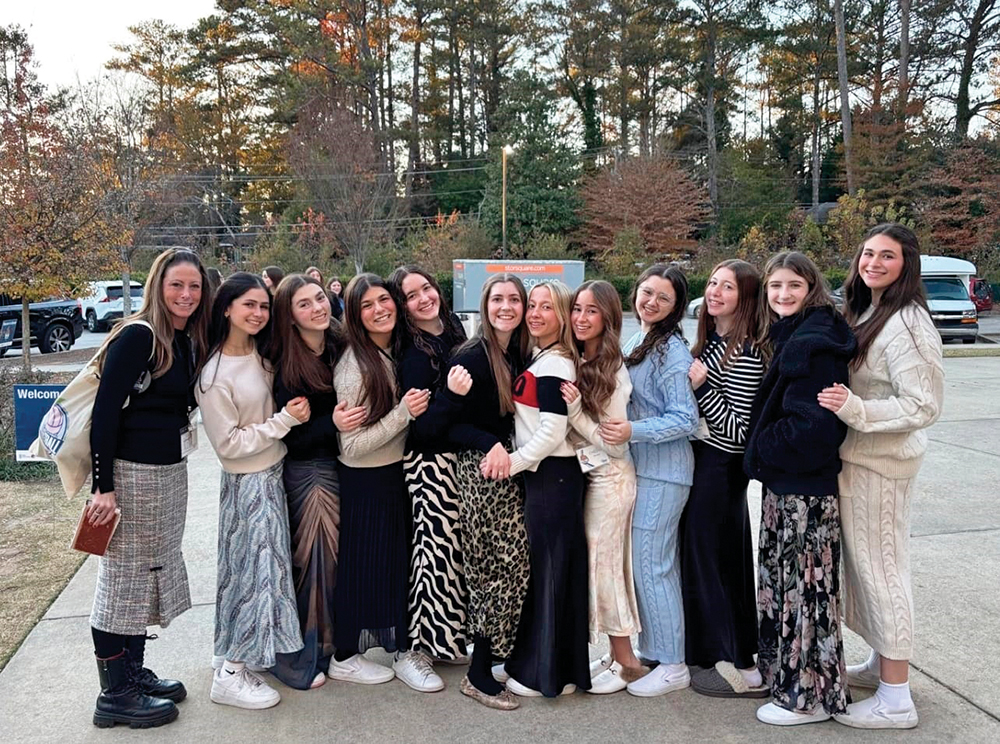U.S. President Joe Biden’s speech on May 7 at the U.S. Capitol, during which he eloquently revisited Nazi Germany’s journey from racial laws discriminating against Jews to outright genocide, demonstrating the parallels with today’s febrile situation along the way, struck all the right notes.
And that, perhaps, was the problem.
While I applauded pretty much every word that I heard, what frustrated me was that there was nothing new. True, it’s reassuring that an American president understands what the Holocaust was, how it was carried out and how it still continues to impact Jewish communities. As Biden said, “[B]y the time the war ended, 6 million Jews—one out of every three Jews in the entire world—were murdered.” Nearly 80 years on from the victory over Nazi Germany, and despite the existence of a Jewish state and an unprecedented flowering of Jewish communities in many of the world’s democracies, there are still fewer Jews now than there were before Hitler embarked on his program of slaughter. And as Biden’s speech indicated, what was in relative terms a post-war “Golden Age” is now over.
That was why I’d hoped I would hear something new, something different. But in the end, even if Biden spoke movingly, his words were safe and, for most Americans, non-controversial. Much of the closing part of his speech was given to a memoir of Tom Lantos, the late California congressional representative and a Holocaust survivor from Hungary who once worked on Biden’s staff. Lantos’s story is certainly inspiring, but an affectionate review of his life isn’t going to explain or deter the antisemitic wave we are facing.
On the pro-Hamas protests that have roiled U.S. campuses, again Biden correctly depicted the slogans and signs on display as “despicable.” Yet there was precious little detail in the speech about how to confront this problem, save for acknowledgement of truths that are widely recognized, at least among Jews (“We know hate never goes away, it only hides”), and a few bland clichés (“We also know what stops hate. One thing: all of us.”)
Any plaudits that Biden earned from American Jews were quickly lost in the days that followed the speech. As Israeli troops prepared for an assault on Rafah, the last bastion of Hamas in the southernmost part of the Gaza Strip, Biden announced a suspension of key weapons deliveries to the Israel Defense Forces in a bid to force a ceasefire. For many Jews, including the huge number who say they would never vote for Donald Trump under any circumstances, Biden’s decision to hand the Hamas rapists and murderers an operational advantage felt like the worst betrayal. Contrasting his speech at the Capitol with the subsequent interview he gave to CNN’s Erin Burnett, it was tempting to conclude that the kinds of Jews that Biden identifies with are those who stoically accept their fate while believing that there is sufficient goodness among the wider population to alleviate their plight. But fighting back? Seeking to destroy irredeemable enemies before they destroy us? That, it would seem, is a step too far.
What could Biden have said that he didn’t say on the day? What aspects of the current surge of antisemitism would have convinced a besieged Jewish community that the leader of the free world is not just an ally, but someone who fundamentally grasps the nature of contemporary threats on multiple fronts?
There was something of a clue in the middle of his speech, when Biden referred to the “ancient desire to wipe out the Jewish people off the face of the earth.” It was this observation that needed expanding because it gets to the heart of the issue. For while the basic impulse here hasn’t changed over the centuries, the difference today lies with the bearers of this message. Pockets of antisemitism remain on the far right and among certain Christians, but that problem can be contained. The existential threat now emanates from Red-Green alliance of Islamists and the far left—this was what Biden should have identified. But he didn’t.
For this coalition, the existence of a Jewish state is the vehicle through which the “ancient desire” described by Biden manifests. Hence, the presentation is different. Whereas Jews were once portrayed as obstacles to spiritual redemption—a cursed people whose existence, as St. Augustine famously argued, is an example of what happens when Christ is rejected—in our contemporary secular world, Jews are obstacles to the realization of national and social justice, universalist goals that have been fatally compromised by Jewish particularism. Yet again, Jews are scorning both the messenger and the message, so yet again, they must suffer for it.
In the pro-Hamas encampments that have sprung up on college campuses across the United States, as well as in Europe and Australia, ancient cries of “Death to the Jews” and other epithets have been heard, but these have been overshadowed by sloganeering deemed progressive and enlightened: “Free Palestine,” “From the River to the Sea,” “Globalize the Intifada” and so on. The immediate targets are not largely defenseless Jewish communities but the denizens of a nation-state armed to the teeth. Jews outside the territory of Israel who denounce the Jewish state are, for the time being anyway, welcome allies, but the remainder—90%, more or less, of the world’s Jews—are beyond the pale for as long as they support the State of Israel.
What Hamas and its Western allies are asking us to endorse is—in the memorable phrase of the 2006 conference in Tehran staged by the Iranian regime—the vision of a “World Without Zionism.” “Anybody who recognizes Israel will burn in the fire of the Islamic nation’s fury, any Islamic leader who recognizes the Zionist regime means he is acknowledging the surrender and defeat of the Islamic world,” the then-president of Iran, Mahmoud Ahmadinejad, declared at the time. For the enemies of the Jews, therefore, this is a zero-sum game: us or them. And that idea has now been globalized, resulting in the transfer of Iranian regime slogans to our campuses and, increasingly, our city streets, our workplaces and all the other locations where we gather to get on with our lives.
That is the challenge that Biden should have addressed.
Ben Cohen, a senior analyst with the Foundation for Defense of Democracies, writes a weekly column for JNS on Jewish affairs and Middle Eastern politics













